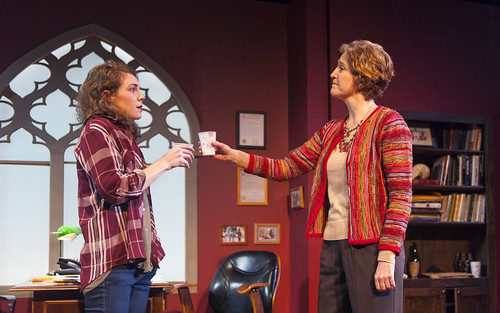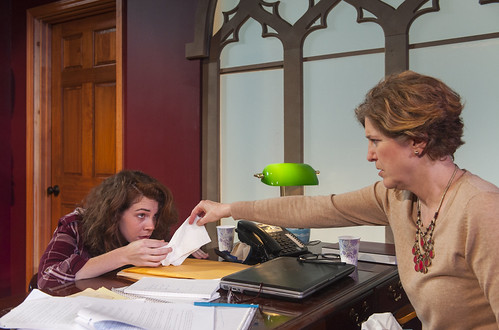Here's what for the How and the Why at Aurora
 Rachel (Martha Brigham, left) and Zelda (Nancy Carlin) toast to their first meeting in Aurora’s West Coast Premiere of The How and The Why by Sarah Treem. Below: Zelda (Carlin, right) offers a tearful Rachel (Brigham) a tissue. Photos by David Allen
Rachel (Martha Brigham, left) and Zelda (Nancy Carlin) toast to their first meeting in Aurora’s West Coast Premiere of The How and The Why by Sarah Treem. Below: Zelda (Carlin, right) offers a tearful Rachel (Brigham) a tissue. Photos by David Allen
Watching a play like Sarah Treem's The How and the Why makes me feel smarter – fractionally but still. To prove my point, I'm going to quote Ernst Mayr, an evolutionary biologist with whom I was unfamiliar before this play. Mayr, as we're told in the play, was interested in the how and the why of things, the mechanism and the function.
Let's apply that to Treem's play, shall we? The how is pretty clear: Treem wrote a two-person play about two evolutionary biologists, an older professor and a younger grad student, having a discussion about their research, their theories and their lives. Berkeley's Aurora Theatre Company chose to produce the play with direction by the redoubtable Joy Carlin and starring Joy's daughter Nancy Carlin as Zelda, the brilliant but somewhat distracted professor, and Martha Brigham, as Rachel, the brilliant but somewhat unstable grad student. The play would be produced in Harry's UpStage, the Aurora's even more intimate space than its already intimate main stage.
The why is also pretty clear: this is a fascinating and, at least in my case, highly educational play in which two interesting and interested women at different places in their lives and careers dive deep into science, gender roles, academia and what it means to be a woman conducting research on the evolution of women and how that works in the patriarchal halls of science.
There's an element of melodrama here as well, and Treem, best known for television writing (House of Cards season one, In Treatment and The Affair), doesn't seem to be as invested in that part of the play. There's a point where a slap occurs, and it's not nearly as deeply felt as some of the more intellectual elements of the play, which truly are fascinating. There's a secret afoot, and Treem doesn't even bother disguising it much, so that when it's revealed, the audience is, by design, already way ahead of the characters.
Where this play soars is when the women are able to fully express their passion for their work. It's sheer coincidence (or is it?) that both women are in the field of evolutionary biology. Zelda's career-defining, Dobzhansky Prize-winning theory is called "The Grandmother Hypothesis" and involves menopause and how it allows women to live longer and assist their children in the raising of their children, thus, as Zelda puts it, inventing childhood.
Rachel, a character inspired by the work of Margie Profet as detailed in Natalie Angier's Woman: an Intimate Geography, has come upon a potentially revolutionary idea. Why do women menstruate exactly? We think we know, but Rachel isn't at all sure. She thinks the process has less to do with the reproductive process and more to do with women's bodies and their defense against what she calls "the toxicity of sperm." This theory, Rachel says, will change the way women think about their bodies, it will change the way men think about women's bodies and it will change the way people have sex.
Zelda recognizes the brilliance in Rachel's theory, but there are many unanswered questions and, as it turns out, Rachel's theory presents certain challenges to Zelda's.
For a talky two-hander, there's actually a lot of action in this play, though we don't see it, for instance, when Rachel presents her abstract at a conference and gets devoured by both male and (to her surprise and deep disgust) female critics. The action shifts from Zelda's nice office (in a revered Boston-area university, not, I think, the Cambridge Community College) to a hockey-themed bar with a popcorn machine (sets and lights by Kent Dorsey), and the discussion, not to mention the tension, between the characters never flags for the play's nearly two hours.
Credit that to Carlin's astute direction and her casting of two actors whose intensity and commitment could manage to make much less crackling dialogue work. Nancy Carlin is so rooted in her character's sensible shoes you half expect her to lead a post-show seminar in the intricacies of menopause and Zelda's time spent studying it within a nomadic African tribe. There's haughtiness in Zelda that no doubt comes from years of being the smartest person in the room and certainly being the most awarded. Brigham's Rachel has her youth and naiveté working against her ferociously powerful mind, but we also see the potential for strength and, if Zelda can be any kind of role model, her potential for scientific ass kicking.
Watching two fierce actors attack meaty material like this is hugely pleasurable, and the fact that we get to learn some fascinating things about half of the world's population is just evolutionary icing on this delectable theatrical cake.
FOR MORE INFORMATIONSarah Treem's The How and the Why continues through May 22 at Aurora Theatre Company, 2081 Addison St., Berkeley. Tickets are $35-$45. Call 510-843-4822 or visit www.auroratheatre.org.
